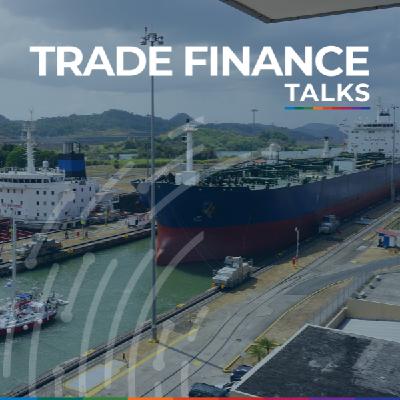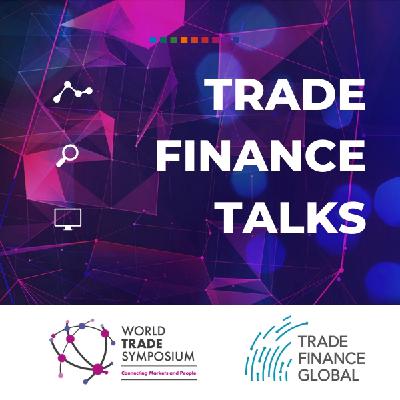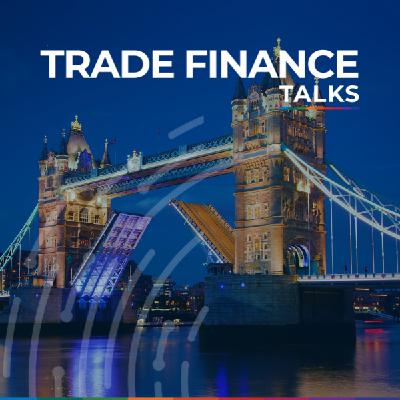Discover Trade Finance Talks
Trade Finance Talks

Trade Finance Talks
Author: Trade Finance Global
Subscribed: 221Played: 3,663Subscribe
Share
© Copyright TFG Publishing Ltd, 2021 All rights reserved.
Description
Welcome to Trade Finance Talks a podcast from Trade Finance Global. During this series, we’ll be hearing from global experts, as well as learning about the latest trends, technology and insights in the world of international trade and receivables finance.
187 Episodes
Reverse
The supply chain finance technique of payables finance is regarded by the industry as a useful and beneficial tool for both buyers and suppliers. Yet recently, it’s come under significant scrutiny by the press, financial Ombudsman, and various regulators around the world. Add to this, the financial distress wrought by the Covid-19 pandemic, with SMEs tending to be the first to feel the effects of financial crises. Peter Mulroy, Secretary General of FCI, Stacey Facter, SVP of Trade Products at BAFT, and Christian Hauscher, Chairman of the Global Supply Chain Finance Forum and Product Manager for Trade and SCF EMEA at Deutsche Bank, discussed why payables finance remains a force for good.
Full article and report here: https://www.tradefinanceglobal.com/posts/podcast-s1-e49-misuse-of-supply-chain-finance-worrying-but-not-widespread-says-gscff/
In anticipation of the BAFT International Trade and Payments Conference from 27-29 February 2024, in Washington, DC, TFG’s Deepesh Patel sat down with Tom Zschach, Chief Innovation Officer at Swift.
In 2023, there are over 68,000 vessels sailing around the oceans, carrying the goods that we all rely on.
Simply put, the world’s oceans and maritime trade flow are massive.
The oceans' vastness presents a particular challenge to monitor and regulate ocean vessels for the maritime transport industry. Of the 68,000 ocean vessels, more than 12%, or 8,000, have an unknown owner, creating significant risks for the industry.
To better understand the world of ocean vessels and maritime trade regulation, Trade Finance Global’s (TFG) Deepesh Patel spoke with Michael Byrne, CEO of IIBLP and Tom Cardamone, CEO of Global Financial Integrity.
Reporting Export Incidents, whether on a voluntary or involuntary basis, as well as investigating non-compliance in relation to trade finance operations, is of huge importance to multinationals, banks and policy makers. With that in mind, Spencer Chilvers, Head of Export Control Policy, Rolls-Royce to discuss export controls, the current sanctions environment, and the future, on Trade Finance Talks!
Full Transcript Here: https://www.tradefinanceglobal.com/posts/podcast-s1-e63-sanctions-rolls-royce-tactical-complexities-voluntary-reporting/
Japan is the third-largest economy in the world, and one of the most open economies with 4% of global GDP. Once perceived a difficult market to enter, it has, over the past 30 years, grown to be a global powerhouse, from automotives and agriculture, to digital trade and innovation.
Today’s podcast focuses on the Free Trade Agreement, FTA with Japan, more specifically referred to as the Comprehensive Economic Partnership Agreement, Or CEPA. The UK and Japan are major investors in each other’s economies, ranking fifth and sixth respectively for inward foreign direct investment.
Full transcript here: https://www.tradefinanceglobal.com/posts/cepa-or-cptpp-an-overview-of-uk-japan-trade/
Understanding Legal Entity Identifiers (LEIs) and their significance for ISO 20022 and Trade Finance: Gerard Hartsink, GLEIF
Allianz Trade’s 2026 Risk Barometer identifies the 10 most pressing concerns faced by corporates for the year ahead, encompassing the views of 3,338 risk management experts, spanning 97 countries and territories. Doğa Usanmaz, Reporter at TFG, sat down with Sarah Murrow, President and CEO of Allianz Trade Americas, to discuss these changes. AI’s jump from eighth to second place in the Barometer rankings in just one year draws attention to the possibility of dark horses when it comes to risk. For Murrow, concentration is one of these dark horses.
The exclusion of micro, small, and medium-sized enterprises (MSMEs) from finance isn’t driven by mere moral neglect, but by systemic infrastructural constraints - amplified by incomplete data.
In a recent episode of Trade Finance Global’s (TFG) podcast series, Trade Finance Talks, Silvia Andreoletti, Senior Reporter at TFG, sat down with Adel Meer, Manager of SME Finance, Solutions & Impact, at the World Bank Group (WBG).
The growth of AI in document forgery, the lethargic response of legislation, and the complexity of international commodity transactions all pose significant challenges to combating financial crime.
Russia has rapidly expanded its “shadow fleet” of ageing, poorly regulated tankers to bypass Western sanctions, now accounting for a significant share of global seaborne oil trade.
Tensions have been high at this year’s World Economic Forum (WEF) held in Davos, Switzerland. The tone was set from Canadian Prime Minister Mark Carney’s proclamation on Tuesday, 20 January, that “the rules-based order is fading”, for which he received a standing ovation.
When Russian tanks rolled into the Donbas, Sumy, Kherson and other regions of Ukraine in the early morning of 22 February 2022, the world watched in horror as the familiar story - a small state bullied into submission by a global superpower - repeated once again. Since then, the role of financial institutions both as providers of financing and pillars of the community has grown more firmly entrenched in Ukraine.
As sudden swings, geopolitical shifts, and the erosion of dollar-dominance reshape the market, foreign exchange (FX) — the global market for trading currencies — has become a central concern for businesses trading across borders.
In the second episode of Future of Trade, Trade Finance Global and Standard Chartered explore why digital trade adoption continues to lag behind innovation.
TFG’s Mark Abrams speaks with Samuel Mathew, Managing Director and Global Head of Documentary Trade at Standard Chartered, on the difference between digitisation and true digitalisation, the interoperability challenges holding paperless trade back, and the role of legacy infrastructure.
The episode also examines the foundations needed for AI in trade finance, the growing relevance of digital assets and tokenisation, and why regulatory progress remains necessary but insufficient for digital trade to scale.
Alternative lenders - non-bank entities that provide financing outside traditional banking channels - are no longer peripheral to the trade finance ecosystem. Their increased presence reflects a structural failure: banks' declining ability to lend to small and medium-sized enterprises (SMEs).
As the environmental cost of global supply chains – responsible for over 60% of global yearly emissions – becomes impossible to ignore, the EU’s Carbon Border Adjustment (CBAM) is emerging as a central tool for aligning trade with climate objectives.
On January 1, 2026, CBAM will move from a reporting framework and become a real financial liability for importers: those who haven’t secured authorised CBAM declarant status will face penalties, higher costs, and operational disruption.
Trade Finance Global’s (TFG) Charles Osborne spoke with Adam Hearne, CEO and Co-founder of CarbonChain, about what this transition means in practice.
Resilience in global trade has moved beyond a defensive strategy. In an era defined by tariffs, technological developments, and shifting patterns of economic growth, it is now integral to sustainable expansion and long-term competitiveness across global supply chains.
In the debut episode of Trade Finance Global’s (TFG) new five-part podcast series, Future of Trade with Standard Chartered, TFG’s Mark Abrams sat down with Sofia Hammoucha, Global Head of Trade and Working Capital at Standard Chartered.
Factoring, a financial practice where businesses sell unpaid invoices for immediate cash, underpins trillions in global commerce, with global volumes nearing €3.8 trillion in 2023
At the 2025 Sibos conference in Frankfurt, Germany, Silvia Andreoletti, Senior Reporter at Trade Finance Global (TFG), had the opportunity to speak with Ximena Alemán, Co-CEO and Co-Founder of Prometeo, a Latin American payments network.
Over the last decade, a new world order has been trying to emerge from the cracks of enduring systems. When Nick Szabo proposed the idea of “bit gold” in 1998, he opened the portal to inventions that changed how humans thought and dealt with money forever.
























ChatGPT said: That sounds like a great initiative for staying informed on global trade trends! For those involved in virtual item exchanges, using a tool like the Kogama Economy Calculator can offer real-time value insights — especially helpful when planning trades. You can explore it here: https://ktctradecalculator.vercel.app/ to streamline your decision-making process and stay ahead in the digital trade game.